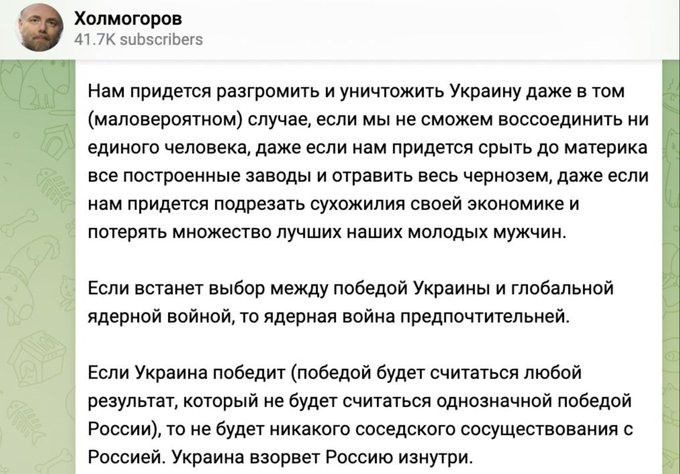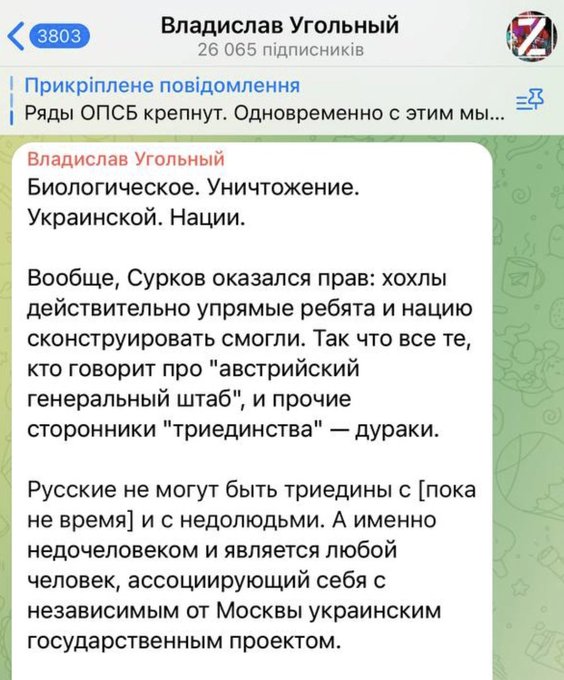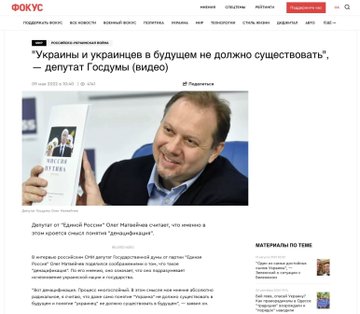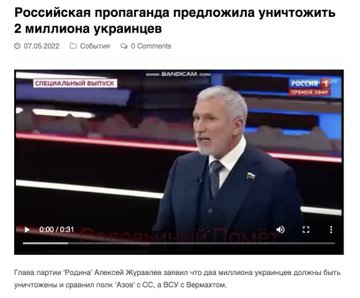Tag: United States
Empty annexations won’t make an empire
I’ve been out of commission for ten days or so. Peacefare was also down for a few days. But both of us are back now and trying to catch up.
The big news is clear: Russia is losing the war in Ukraine. Kyiv has forced Moscow’s retreat both in the northeast and to a lesser extent in the south. Russia’s hold on remaining occupied territory is precarious, though stronger in the south than in the the northeast. The Wagner group, a supposedly private security force reporting directly to the Kremlin, has proven much more reliable there than the regular Russian army and even than the Donbas proxies elsewhere.
Doubling down
Putin’s reaction is to double down. He has ordered a partial mobilization that has driven tens of thousands of Russians out of their country. He has also signed a piece of paper claiming to annex four Ukrainian provinces, though Russian forces control only a portion of them. The annexation is nominally a response to fake referenda conducted among the way fewer than 50% of the population of those provinces actually under Russian control. Russian troops carried the ballot boxes door to door and asked people to vote at gunpoint. Moscow claims to have annexed largely empty territory it is incapable of repopulating.
Ukraine has doubled down as well. Its army continues to perform far beyond expectations. Newly armed and amply inspired, it is taking territory at a fast pace. Kyiv has also submitted an application for NATO membership. That is unlikely to be approved before Russia is driven completely from Ukrainian territory, including Crimea. Even then there will be opposition inside the Alliance. But it signals the realignment that Putin has incentivized. It would be hard to convince any Ukrainian loyal to Ukraine that NATO membership is not in Ukraine’s interest. Even if Ukraine never accedes, it will be aligned with NATO in the future.
Shrinking war aims
Despite doubling down, Moscow has shrunk its war aims. Putin has abandoned for now his original objective, the conquest of Kyiv and the absorption of all of Ukraine into an extended Russian empire. He won’t be able to absorb all of Luhansk, Donetsk, Zaporizhzhia, and Kherson either:

The parts of Luhansk and Donetsk that were under Moscow’s control from 2014 until this year did not fare well under Russian rule. Any territory that remains under Russian control when a ceasefire some day takes effect will be depopulated and depressed. Even if Putin wins, those whom he governs will lose.
More modest but sustainable ambition is needed
Putin conceives of himself as engaged in a global struggle against a perverse, exploitative, and violent West. He is losing that struggle not only on the battlefield in Ukraine but also throughout Europe and in the democratic Far East. Even India and China are distancing themselves. His confidence in the 1000-year Russian state is grossly overwrought. Russia is a second-rate petro power with nuclear weapons he knows it can’t use without precipitating a catastrophic response. It is time for Russians to wake up and do what they know needs doing: get rid of him and his coterie and return Russia to a more modest but sustainable ambition.
The West has no alternative
Russian President Putin today announced a partial mobilization, insisted on referenda in the territories Russia occupies in Ukraine, as a prelude to annexation, and threatened the West with nuclear weapons. In the wake of Ukraine’s successful offensive in the northeast region of Kharkiv, Moscow is doubling down.
No surprise, but still signficant
Putin’s speech is no surprise. He desperately needs more cannon fodder to fight in Ukraine. He has likely lost to death and injury about 75,000 troops in 7 months, more than America’s losses in both Afghanistan and Iraq over 20 years. The referenda had been scheduled previously and postponed due to the precarious military situation. Putin has previously threatened the use of nuclear weapons.
But the message is wider than any of these items. Putin is preparing to sacrifice the entire Russian army to gain a few provinces in Ukraine. He sees himself at war not only with Ukraine but with the West, which he blames for provoking him into attacking Ukraine. After months of telling the Russian people they could continue their normal lives during his Special Military Operation, now he is asking for extraordinary sacrifices.
Not much there there
A lot depends on how the Russian’s citizens react. So far, most have ignored the war, while some have fled Russia and others have urged Putin on and even volunteered for service in Ukraine. The reservists Putin is calling up may or may not appear for duty. The sanctions, which so far have caused relatively little real pain, may begin to bite. But the Russian pain threshold is high. They’ve had a lot of practice.
There is no doubt about the outcome of the referenda. Putin doesn’t believe in real choice when voting. They are nevertheless important, as once Moscow annexes the Russian occupied territories Putin will claim they are integral parts of the Russian Federation. Ukrainian attacks will therefore provoke a less “special operation” response.
The nuclear weapons threat is an empty one. Ukrainian forces aren’t concentrated in ways that would make them vulnerable to giant explosions. If nevertheless Putin proceeded, he should understand the Western response would be disproportional and devastating.
The best outcome is Russian defeat
Putin’s speech leaves the West with little alternative. Restraining the Ukrainians now would no doubt please Putin, but it wouldn’t get him withdraw. Pushing the Russians back to the February 23 lines would no longer be a satisfactory outcome. From the Western perspective, the best outcome of this dreadful war is a complete and unequivocal Russian defeat.
That is possible. The Ukrainians have shown skill and determination under extraordinarily difficult conditions. The Russian hold on Donetsk is precarious. Kherson is vulnerable.

Another major loss of territory like the blue area near Kharkiv would dramatically undermine Putin’s credibility. So too would a split in the territory the Russians control along the Sea of Azov.
Ukrainians have the initiative
Winter is coming, but there are still several months of fighting season ahead. The Ukrainians have seized the initiative. They merit wholehearted support against an enemy that calls them Nazis but itself resembles the Third Reich moving into the Sudetenland. Putin, unlike Hitler, is losing his war of aggression. That’s good. The West has no alternative but to support his opponents.
No, it’s not ending until Zelensky says so
Ukraine has won back substantial territory in Kharkiv province in the past 10 days or so. They snookered the Russians into thinking the offensive would come in the south. Moscow moved many of its best troops there, leaving the northeast ill defended. And in recent days both China President Xi and India’s Prime Minister Modi have scolded Russian President Putin, suggesting he should sue for peace. This has made some wonder if the end of the war is near.
Location, location, location
The short answer is no. Russia still has vast resources of men and materiel to throw at the Ukrainians. Putin might like a ceasefire to give himself some time and space to resupply. But that is a far cry from readiness to negotiate a serious settlement. Nor are the Ukrainians interested in allowing the Russians to stay on their territory. President Zelensky has made it clear he is fighting for 100% of his 2014 pre-invasion sovereign territory. He will come under pressure from the Europeans and Americans to accept a ceasefire if Russia is rolled back to the lines of February 23.
Identity, identity, identity
I doubt even then Zelensky will be tempted to stop if his forces are still moving in the right directions. The war has vastly increased his own popularity, from a nadir a year or two after his election. He would be risking disappointment on the home front if he stopped the war before regaining as much territory as possible.
Ukrainians have gained a far stronger sense of national identity than appeared to exist before the war. This is what happens when you kill people because of their identity. It reinforces that identity among those who remain alive. Ukrainians know that the discourse in Russia is genocidal.
How would you feel if you were Ukrainian?
Stéphane Siohan tweets some compelling examples:
#Ukraine I am not sure that Europe and the world understand the nature of the genocidal discourse about Ukraine circulating in the Russian information space. Read the following excerpts. — THREAD (1)
Telegram channel of the journalist Ehor Holmogorov: “We will have to crush & destroy #Ukraine even if we have to tear down all their factories and poison all the black soil, even if we have to cut the tendons of our economy and lose many of the best our young men.” (2)

Journalist Ehor Holmogorov: “If the choice is between a Ukrainian victory and a global nuclear war, then a nuclear war is preferable. If Ukraine wins , then there will be no neighborly coexistence with Russia. Ukraine will blow up Russia from within (3)
Vladislav Ugolnyi, Russian publicist: “Biological destruction of the Ukrainian nation. Russians cannot be live in unity with subhumans. Namely, any person who associates himself with a Ukrainian project independent of Moscow is a subhuman.” (4)

Russian Duman MP Oleh Matveychev: “Ukraine and Ukrainians should not exist in the future.” The head of Russian party “Motherland”, Alexei Zhuravlev, proposes to “destroy two million Ukrainians”.


A hard winter of cold and deprivation could temper Ukrainians’ enthusiasm for continuing the war. But until it does the Russians have little hope of convincing Ukrainians that they would be better off negotiating than continuing the fight.
Russia thinks it has better odds with the Europeans
The Russians think some in the European Union are likely to cry uncle before the Ukrainians do. But the situation there isn’t as bad as it might appear. Those whom Russia most directly threatens will remain stalwart. Estonia, Latvia, Lithuania, and Poland know that they are next if Putin succeeds in Ukraine. Sweden and Finland have abandoned neutrality and stand with NATO. Germany is vulnerable because of its reliance on Russian gas, but Berlin appears to have made progress in avoiding a catastrophe when Moscow cuts it off during the winter. France depends far less on Russian gas but President Macron fancies himself a skilled mediator. He isn’t likely to succeed in that role. Gas prices have hit the UK economy hard, but it has been a strong and constant supporter of Ukraine.
Are the Americans soft?
President Biden has so far been rock solid in backing Ukraine with money, arms, and diplomatic support. There are however on both right and left in the US Congress some who are less committed and even a few who implicitly back Russia. That perspective has had little traction with the American people. But it is possible, if the economy dips into recession, that doubts will grow. There is also a portion of the American foreign policy establishment that worries about the impact on Russia of a defeat. Some prefer the devil they know, especially if he has nuclear weapons.
But Biden sees Ukraine as a main theater of conflict with autocracy. Were the Ukrainians to lose, or settle for an agreement that leaves Russian troops on their soil and ready to make war again in the future, it would look as if autocracy had won. He is unlikely to yield until compelled.
Stevenson’s army, September 17
Celebrate the signing of our foundation document in 1787.
Legal historian Jack Rakove notes that Madison favored a Senate based on population, not two per state. [Of course, he was from a big state.]
NYT has long piece with data showing how the US system deviates from representing public opinion.
Charlie Savage has new documents showing DOJ legal opinions on war powers.
In 60 Minutes interview, Biden warns Russia of Ukraine escalation.
Economist says Poland is opening a canal to bypass Kaliningrad.
My SAIS colleague Charlie Stevenson distributes this almost daily news digest of foreign/defense/national security policy to “Stevenson’s army” via Googlegroups. I republish here. To get Stevenson’s army by email, send a blank email (no subject or text in the body) to stevensons-army+subscribe@googlegroups.com. You’ll get an email confirming your join request. Click “Join This Group” and follow the instructions to join. Once you have joined, you can adjust your email delivery preferences (if you want every email or a digest of the emails).
Embellishing reality isn’t helpful
Genc Pollo, former minister and member of parliament in Albania, reacts to this “debrief” with US Ambassador to Belgrade Chris Hill:
“War is too important to be left to the generals” is a bon mot attributed to Georges Clemenceau. As French Prime Minister, he oversaw the victory of his country and the Entente Alliance in the First World War.
I would hesitate a lot to apply his wisdom to diplomats dealing with the Balkans, especially with former Yugoslavia problems. Diplomats here means primarily European and US officials trying to find solutions to challenges ranging from bloody conflicts to dangerous political impasses.
We ought to be thankful for their well-meaning efforts and should celebrate the ones with successful outcomes.
Still listening to this interview of Christopher Hill, the US Ambassador to Serbia, with the Atlantic Council I was a bit perplexed. Disclosure: he’s a good friend of mine from the early 90s when he was a cooperative a helpful Deputy Head of Mission in Tirana. Chris Hill is connoisseur of the region with a lot of experience in difficult situations. He is right in most of what he says. But some of his assertions could be problematic. Let us take these issues one by one.
Issue 1: “There is a criticism that you sometimes hear in the Balkans that somehow this is some effort by Serbia which is so big to dominate the others. That’s the kind of criticism you might have heard in the European Union decades ago about Germany….I’m not sure it’s that valid a criticism.”
Germany is big for sure, but in the initial EEC of six and the actual EU of 27 member states, she finds herself in a balanced structure in terms of political power, economic weight, and population. Berlin carries much weight but can’t and doesn’t rule single-handedly. Look at the European Central Bank.
Besides post-war Germany is a friendly democracy.
By contrast, within the Open Balkans trio (Serbia, Albania, and North Macedonia) Serbia would rule unchallenged.
Issue 2: “[Open Balkans] does support EU standards, in terms of the rule of law, in terms of regulations.”
It remains a mystery to many why supporters of Open Balkans are silent about the Common Regional Market of the Berlin Process. Or trash it along with defunct initiatives. The Berlin Process has all the pretended virtues of Open Balkans and none of its serious downsides. Simple question: would you trust the observance of EU standards in a Western Balkans initiative where the EU is institutionally involved rather than in a local get-together hosted by two corrupt autocrats? Lobbyists might paint a Potemkin village, but Serbia and Albania are well advanced in their latest trajectory towards one-person rule.
Issue 3: “I would say that the Serbian relationship with Albania is as good as it’s probably ever been in history.”
The relationship between Albania and Serbia has generally been always excellent or normal, Including during the rule of Enver Hoxha and Josip Broz Tito. It went awry when things in Kosovo turned terrible. The current rapprochement between Prime Minister Rama and President Vučić is solves a problem that doesn’t exist. It hasn’t contributed in any meaningful way to “normalization” between Kosovo and Serbia, let alone mutual recognition, which is the crux of the matter!
Issue 4: “But I think, if you look at the broad sweep of this issue and the broad arc of where Serbia is going, it’s heading West. You point out the opinion surveys that suggest that Serbia that many Serbs have sympathies that lie further east. …if you look at where Serbian young people are going for their education for jobs, for their training and what type of model they see themselves focusing on, it’s very much toward the West.”
Past are the days when people in the West should believe globalization and economic engagement wwill tame China and Russia, nudging them towards becoming responsible actors in the rules-based world order. We’ve seen Chinese and Russians, including the nomenclatura’s offspring, enjoying life or studying in the West only to return home to embrace autocracy and imperial revisionism.
This to some reasonable extent applies to Serbia. Because the nature of the Serbian regime has not changed much, and its propaganda has worsened.
If the model of post-Milosević Serbia applied to post-war Germany, it would mean having Joseph Goebbels as West Germany’s chancellor in the 60s. He would have refused to adopt Western policies toward the Soviets.
This is reality, and embellishing it isn’t helpful.
Strategic failure has consequences
9/11 produces lots of reflections. Here are mine.
Tactical success, strategic failure
The Al Qaeda attacks using commercial aircraft were largely successful. Three of four hit their intended targets and killed lots of people. But that tactical success did not lead to strategic victory. The Americans and others have hunted Al Qaeda for 20 years, killing not only its two leaders and many foot soldiers but destroying much of its organizational capacity.
But that tactical success has also not led to strategic victory. Al Qaeda has splintered and metastasized, spinning off the Islamic State and other extremist jihadi insurgents fighting in many more countries than two decades ago. This includes not only the imploded Middle Eastern states of Syria and Yemen, but also the African states of Libya, Mali, Mozambique, and Somalia.
Thus the prospect of tactical success tempts those with the capacity for violence into enterprises that end in strategic failure. This happened to the US in both Iraq and Afghanistan. We invaded because we could. Tactical success however saddled us with burdens we did not want. It took 10 years to extract most US forces from Iraq, and 20 from Afghanistan. The failure of state-building in Afghanistan has vitiated most gains from the initial military success. In Iraq, the failure is not complete, but the costs have been high.
It’s Russia’s turn
The Russians are now facing their own consequences of strategic failure. Their initial invasion of Ukraine in 2014 was largely successful. They annexed Crimea and occupied most of Luhansk and Donetsk using proxies. But President Putin wanted more. This year he tried to take Kyiv, complete the conquest of Donbas, and expand Russian control in the south. The Ukrainians fought off the attack on their capital and are now pushing the Russians back rapidly in Kharkiv province as well as more slowly around Kherson.
The ultimate military outcome is still uncertain. The Ukrainians could over-extend themselves. The Russians could succeed in regrouping and stop the Ukrainian advances or even return to territory they have lost in the past week.
But the strategic failure is already apparent. The Russian army, air force, and navy are in tatters. A reinvigorated NATO is expanding to Finland and Sweden as well as the troop presence on Russia’s borders. Sanctions are sapping the Russian economy. Europe is weaning itself rapidly from Russian oil and gas. States on Russia’s periphery are looking for opportunities to expand ties with the West. Nationalists in Russia who advocated the Ukraine war are turning on Putin. The war is solidifying Ukrainian national identity, increasing support for President Zelensky and the Ukrainian state even among Russian speakers.
The lesson
What should we learn from these strategic defeats of great powers? Confident of their military superiority, they go to war for reasons they think worthy. But war is a political as well as a military enterprise. Tactical military superiority makes it difficult to consider the consequences of strategic failure. Strategic failure is however always a possibility even if you win a war, as the Americans did in Iraq and Afghanistan and the Russians did in 2014 in Ukraine. This failure to take into account the real possibility of strategic failure is a major source of the blunders that lead to war.
Apply it to Iran
A quick footnote on applying this lesson to Iran. Israeli and American military superiority is overwhelming. But Iran is a big country, more or less the size and population of Iraq and Afghanistan combined. No one should be thinking about an invasion. Even hawkish thinking is limited to attacking Iran’s nuclear facilities and supporting infrastructure. Tactical success in that enterprise is not certain, as the Iranians have put a lot of their enrichment facilities deep under ground.
But strategic failure is almost certain. An Iran that has suffered an attack on its nuclear facilities will surely redouble its efforts to get nuclear weapons, as that would make repeat of the attack unthinkable. Sure, the attack could be repeated ad infinitum, “mowing the grass” as the Israelis say. But sooner or later Tehran would succeed in getting nuclear weapons. What then? Tactical success guarantees nothing. Strategic failure has consequences.




 RSS - Posts
RSS - Posts
